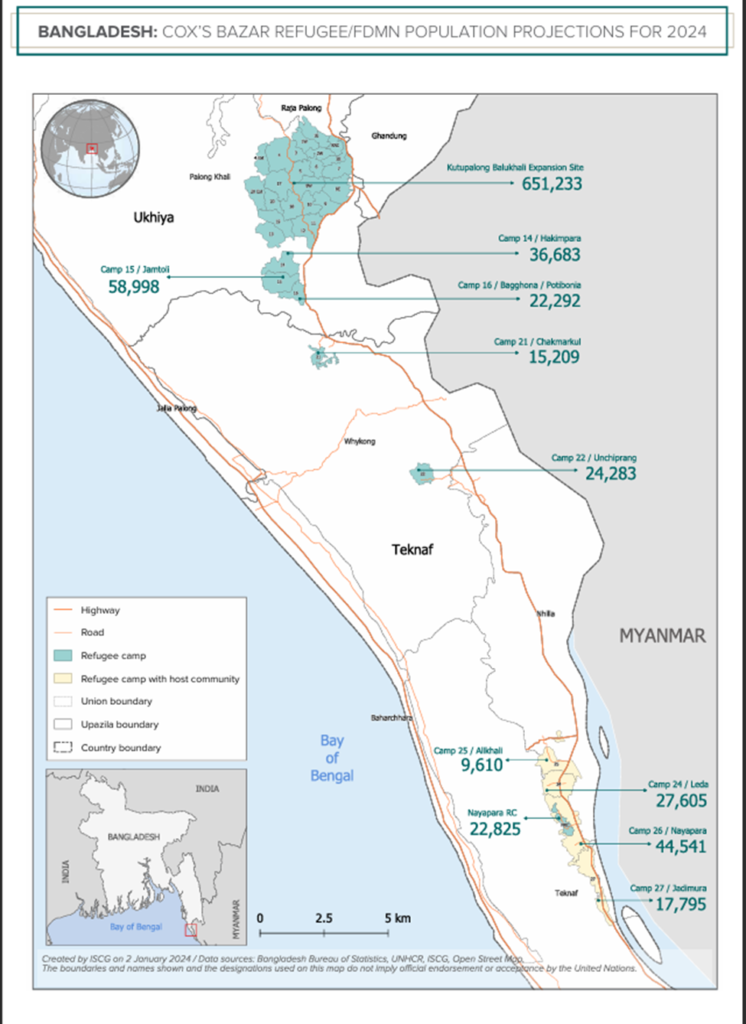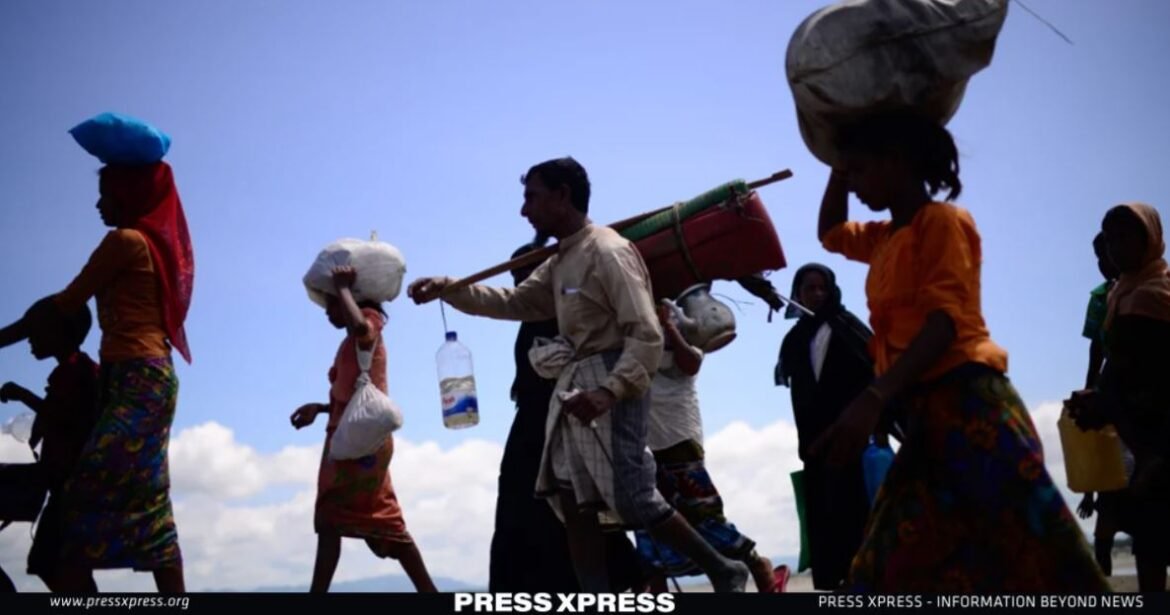Key Highlights:
- Recently, both the United States and Norway have pledged substantial support, totaling over $8.2 million within the 2024 Joint Response Plan for the Rohingya Humanitarian Crisis
- Japan has already contributed $2.6 million
- Critical life-saving food assistance, valued at $12.50 per person per month in 2024, remains vital to fulfilling minimum energy and nutrient requirements, now including fortified rice since January 2024
The Rohingya refugee crisis has captured global attention as a pressing humanitarian issue. Recently, both the United States and Norway have pledged substantial support, totaling over $8.2 million, towards the International Organization for Migration’s (IOM) appeal within the 2024 Joint Response Plan for the Rohingya Humanitarian Crisis.
You can also read: Population Policy Revolution: Transforming People into Productive Resources
The proposal aims to secure around $852.4 million to support 117 partners, with 58 of them being Bangladeshi NGOs. This funding will be utilized to address urgent requirements of Rohingya refugees/FDMNs in Cox’s Bazar and Bhasan Char, while also lessening the repercussions on host communities, particularly in Ukhiya and Teknaf Upazilas.
After visiting Cox’s Bazar, several governments have committed to aiding the cause:
- The United States has pledged $7.6 million.
- Japan has already contributed $2.6 million.
- Norway has announced a contribution of NOK 70 million equivalent to USD 6.5 million.
Additionally, countries like Sweden and Switzerland have expressed political backing for the Joint Statement and the 2024 Joint Response Plan for the Rohingya Humanitarian Crisis.
While this financial assistance is crucial for addressing the immediate needs of Rohingya refugees, the crisis persists. Beyond monetary aid, there’s a pressing need for diplomatic intervention to facilitate the refugees’ repatriation to their homeland.
Bangladesh has generously hosted close to a million Rohingya refugees, yet the strain on its resources is becoming increasingly evident. The international community must rally behind Bangladesh, offering diplomatic support to seek a sustainable resolution to this crisis.

Priority Sectors of the 2024 Joint Response Plan
In June 2023, the World Food Program’s Post-Distribution Monitoring revealed concerning trends following two rounds of food ration reductions: acceptable food consumption plummeted from 56% to 22%, while reliance on humanitarian aid surged from 95% to 97%.
Advocating for a restoration of full rations, the sector commits to providing inclusive, life-saving, nutrition-sensitive food assistance to Rohingya refugees in camps through e-vouchers. Additionally, extremely vulnerable households will receive supplemental support.
Critical life-saving food assistance, valued at $12.50 per person per month in 2024, remains vital to fulfilling minimum energy and nutrient requirements, now including fortified rice since January 2024.
Distribution via e-vouchers at camp outlets not only benefits recipients but also supports local farmers and Bangladeshi traders. Efforts will prioritize sourcing produce from local aggregation centers, and bolstering market connections for host community farmers.
Contingency stocks of in-kind food will be maintained for swift assistance during emergencies or natural disasters. The Food Security Sector (FSS) will persist in resilience-focused endeavors, expanding food source diversity for refugees and host communities.
Ongoing initiatives include training in homestead gardening, pond aquaculture, and education on food safety and processing. Support for host communities will extend to farm-based income generation and specialized services, while investments in smart agricultural infrastructure will enhance producers’ market access.

Norwegian Aid Brings LPG
Norway’s support will bolster efforts to provide cleaner cooking energy to Rohingya refugees, continue the rehabilitation of biodiversity and ecosystems, and facilitate enhanced skill development for both refugees and Bangladeshi host communities. The timely contribution from both the Government and the people of Norway is crucial. It ensures the uninterrupted provision of Liquefied Petroleum Gas (LPG) to around 190,000 refugee households.
These initiatives are integral components of the Safe Access to Fuel and Energy Plus, phase 2 program (SAFE+2), a collaborative endeavor among the Food and Agriculture Organization (FAO), the IOM, the UN Refugee Agency (UNHCR), and the World Food Program (WFP).
Launched in July 2022 as a joint UN initiative, SAFE+2 receives backing from the Governments of Canada, Sweden, and now Norway.
Why Foreign Financial Support Is a Necessity Now?
In 2023, the Joint Response Plan highlighted a shortfall of $301 million, triggering significant adjustments in aid provisions. These adjustments, such as cuts in food supplies, worsened food insecurity and made communities more susceptible to exploitation. Without adequate funding, over 150,000 individuals face exclusion from vital services like food, clean water, shelter, protection, and healthcare.
Furthermore, approximately 100,000 households may resort to firewood collection instead of using LPG, potentially resulting in the extraction of 14,000 tons of firewood monthly and causing deforestation and adverse environmental consequences.
To foster a sustainable humanitarian response, the global community needs to rally behind the Joint Response Plan 2024. This plan seeks to secure $852.4 million to assist 1.35 million people, including Rohingya refugees and vulnerable Bangladeshis, amounting to $630 per individual.
Addressing Humanitarian Shortfalls in 2023 and the Call for Support in 2024
| Parameter | Value |
| Shortfall in Joint Response Plan (2023) | $301 million |
| Individuals at risk of exclusion (2023) | >150,000 |
| Households considering firewood collection (2023) | ~100,000 |
| Monthly firewood extraction (2023) | 14,000 tons |
| Required funding for Joint Response Plan (2024) | $852.4 million |
| Number of beneficiaries (2024) | 1.35 million |
| Assistance per individual (2024) | $630 |
Diplomatic Push for Rohingya Repatriation
A resolute diplomatic stance from Bangladesh may prompt action from the US and European nations to address the democratic crisis in Myanmar further. Strengthening ties with the West through academic, cultural, and commercial exchanges can help garner support and cooperation from these nations.
To increase pressure on Myanmar, the UN Security Council should revisit Rohingya refugee camps and advocate for the establishment of “safe zones” for all conflict-affected individuals. Bangladesh should persist in its diplomatic endeavors, urging continued engagement from other countries, with a primary focus on ensuring safe conditions for Rohingya repatriation.
The ultimate aim is to alleviate the widespread fear of persecution haunting the Rohingya community.
The recent support from nations like the United States, Norway, and Japan marks a significant step forward in alleviating the immediate suffering faced by Rohingya refugees in Cox’s Bazar and Bhasan Char. However, amidst the financial aid and diplomatic efforts, the urgency of facilitating repatriation to their homeland cannot be overstated.
As we strive to meet the objectives outlined in the 2024 Joint Response Plan, let us remember that beyond monetary assistance lies the imperative for sustained diplomatic intervention to ensure a safe and dignified return for the Rohingya community.


